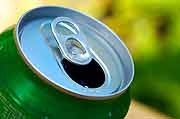

Soft drinks and other sugar-sweetened beverages can seriously damage heart health, a new review finds.
The added sugar in sodas, fruit drinks, sweet teas and energy drinks affects the body in ways that increase risk of heart attack, heart disease and stroke, said review author Vasanti Malik, a nutrition research scientist at Harvard’s T.H. Chan School of Public Health in Boston.
Consuming one or two servings a day of sugar-sweetened beverages has been linked to a 35 percent greater risk of heart attack or fatal heart disease, a 16 percent increased risk of stroke and as much as a 26 percent increased risk of developing type 2 diabetes, the report concluded.
“Reducing the consumption of these drinks, it’s not going to solve the heart disease epidemic, but it’s one step that can have a measurable impact,” Malik said. “It’s not the only thing that needs to be done, but it’s a very important thing.
The report, published Sept. 28 in the Journal of the American College of Cardiology, is part of a new focus on excess sugar as a risk for heart disease, said Marina Chaparro, a clinical dietitian at Joe DiMaggio Children’s Hospital in Hollywood, Fla.
“Previously, everything focused on low fat, and reducing fat and cholesterol,” said Chaparro, a spokeswoman for the Academy of Nutrition and Dietetics. “The dietary guidelines that are about to come out really focus on added sugars, and not as much on cholesterol and total fat. Those are important, but the impact of sugar has become much more profound.”
Sugar-sweetened beverages account for about one-half of added sugars in the U.S. diet, Malik said. One can of regular soda contains about 35 grams of sugar, which is equal to nearly nine teaspoons.
Manufacturers most often use either table sugar or high-fructose corn syrup to sweeten beverages, researchers said. Both sugar sources contain roughly equal parts of two simple sugars, fructose and glucose.
Researchers believe both fructose and glucose damage the heart. Glucose spikes blood glucose and causes insulin levels to rise, which can lead to the development of type 2 diabetes, Malik said. Diabetes is a risk factor for heart disease.
Fructose also causes heart health issues, but in more insidious ways. Its presence can prompt the liver to release triglycerides and “bad” LDL cholesterol into the bloodstream, Malik said. Too much fructose can lead to fatty liver disease.
Overconsumption of fructose can also lead to too much uric acid in the blood, which is associated with a greater risk of gout, a painful inflammatory arthritis. Inflammation also has been linked to heart disease, Malik said.
Finally, fructose has been shown to promote the accumulation of belly fat, another risk factor for heart disease, she said.
William Dermody Jr., vice president of policy for the American Beverage Association, said the new report unfairly knocks sodas and sweet drinks.
“Here again is a study that in no way proves sweetened beverages uniquely cause illness, yet attempts to suggest it nonetheless,” Dermody said. “There is no difference between sugar inherent to a product and sugar added to a product as far as the body is concerned. In both cases, the body metabolizes both the same way. This study’s attempt to ‘link’ beverages to disease cannot overcome that well-grounded scientific finding.”
But researchers are concerned that the liquid sugars in sweetened beverages might have a stronger impact on the body, Malik said.
“The fact it’s in liquid form is something that’s really of concern, because the sugars are absorbed really rapidly,” she said. “They enter the bloodstream very quickly.”
For now, the researchers urge consumers to reduce the amount of added sugar in their diet.
Limiting or eliminating sugar-sweetened beverages is a solid first step, Malik said, noting many foods also contain added sugar.
The U.S. Department of Agriculture has proposed a new Nutrition Facts label that will identify the amount of sugar added to a product, versus the amount that occurs naturally in the food, Chaparro and Malik said.
For example, a container of yogurt might note that 9 grams of sugar come from the milk in the product, but that another 10 grams of sugar have been added to make the yogurt even sweeter, Chaparro said.
Until the new label is available, consumers can avoid added sugars by paying close attention to the current Nutrition Facts label — which does list total sugars — and by scanning the list of ingredients for dextrose, sucrose, molasses, sugar, syrup or high-fructose corn syrup, Chaparro said.
If any of those are listed, she said, “you know that it’s added sugar.”
More information
For more on added sugar and heart disease, visit the American Heart Association.
Source: HealthDay
Copyright © 2024 HealthDay. All rights reserved.

Leave a Reply